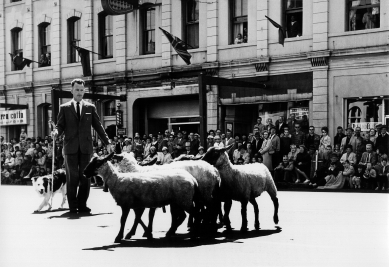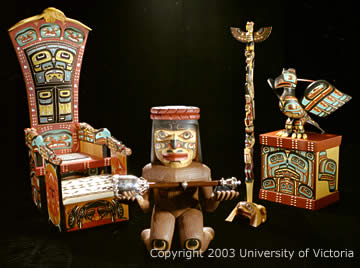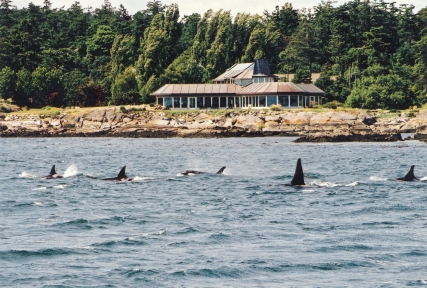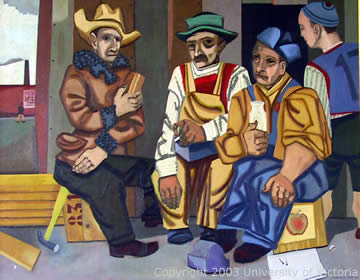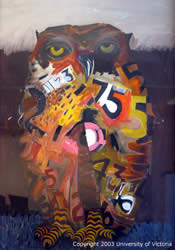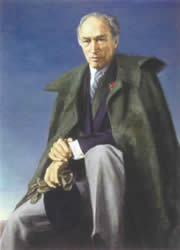

About ExhibitSelected works from the vast Michael Williams collection of West Coast art will be displayed at the Pendulum Gallery (HSBC Building) in Vancouver from March 8-19, 2004. The exhibit sponsor is HSBC Bank Canada. Michael Collard Williams: Publican and Patron of the ArtsWritten by Nicholas Tuele, Co-Curator Foreword: I first met Michael Williams in 1981 upon my arrival in Victoria to assume a curatorial position at the Art Gallery of Greater Victoria. Over the years, as his art collection grew, he would relish the opportunity to show off his latest treasure whenever I visited the Swans Pub. Michael enjoyed talking about art and the artists represented in his collection and he valued the repartee of a vigorous art discussion.
Michael Collard Williams (1930 – 2000) was a self-made millionaire and high profile community member in Victoria society since his arrival here in 1958. He was widely regarded as a successful businessman, developer and heritage conservationist. So much so, that in 1990 he received an Honorary Doctorate degree from the University of Victoria. The University recognized and respected the value of his vision, hard work and determination in the restoration of old town and the enduring value of his commitment to the community.
Williams, having received little formal schooling, was an ardent supporter of the value of higher education. After years of collaboration with the University he conceived a bold idea that led to the creation of a unique set of ceremonial furnishings to be used in the conferring of degrees. Williams underwrote the expense of the making of the furnishings, which include a stunning Chancellor's chair, kneeling stool, lectern, mace stand and chief speaker's staff. The furnishings, created by 12 of the province's best-known First Nations artists, demonstrated generosity and creative thinking that were a small foreshadowing of what was to come. Williams amassed his fortune in real estate development and was particularly noted for his sensitive re-cycling of historic buildings. Indeed, Williams was known as “Mr. Old Town” in recognition of his visionary redevelopment projects. What was not as broadly known until his death was his passion as a collector of fine art and his deeply ingrained philanthropy. News headlines trumpeted the announcement of his will that confirmed his intention to leave virtually his entire estate to the University of Victoria. The total bequest, primarily in the form of real and personal property, was assessed at a net value of $17 million. It was the largest gift to UVic in the university’s then 39-year history. In addition to “The Point,” an astonishing mansion on the sea that he had built, other assets left to UVic included Swans Hotel, nine more city properties, six townhouses in Saanich and an extensive art collection.
Williams collected assiduously in the areas that piqued his interest. His contemporary art collection, the subject of this exhibition and catalogue, was only a part of a much broader range of collections that included historical First Nations art, antique furniture and carpets, ancient maps and more. The contemporary art collection comprises 644 pieces with representation by many of British Columbia’s most significant artists of their generation. Major works by Jack Shadbolt, Maxwell Bates, Myfanwy Pavelic, Susan Point, Robert Davidson, Toni Onley and others form the core of Willams contemporary art collection. Importantly, Williams supported numerous “up and coming” artists through acquisitions of their paintings including artists like Angela Grossman, Noah Becker, Marlene Davis, Brad Pasutti and Vicky Marshal among others. Like many collectors with the means to indulge their passions, Williams was both avid and eclectic. If there is a focus to his contemporary art collection it is no more nor less than “made in British Columbia.” He enjoyed meeting and talking with artists and he was confident in his decisions to acquire the works of both established and emerging artists. As he was known in the business world so it was in the art world - he recognized a good deal when he saw one and he knew how to drive a shrewd bargain. With regard to the latter, Williams often reminded artists that his collection would one day belong to the University of Victoria. This allowed him to leverage his purchase dollar with the implied cachet of the artist being represented in a more broadly significant and permanent collection. As well, upon studio visits, Williams would negotiate purchase prices based on buying a number of the artist’s works thus resulting in a lower price per work. Besides having the financial resources to acquire art as his whim or intention dictated, Williams relished being able to display a great deal of the hundreds of paintings, prints and sculptures that he acquired. Throughout Swans Hotel, for example, there are hundreds of original art works in the suites, restaurant and pub.
There are many other signature works by the artists represented in the Williams collection. “Workmen,” for example, is a classic in Maxwell Bates oeuvre. Bates (1906-1980) was a dynamic influence in the BC arts scene and a founding member of the Limners Group. His work may be described as expressionist and his best paintings are insightful statements about people and the human condition. This painting, along with many others by Bates, was purchased at the estate auction of the artist’s widow. Williams had a great admiration for the work of Jack Shadbolt (1909 – 1999). Indeed, as a member of the Art Gallery of Greater Victoria’s Acquisition Committee, Williams exhorted his colleagues to seek out as many Shadbolt works for the permanent collection as possible. With a collector’s foresight and businessman’s acumen, Williams understood that the works by this brilliant artist would appreciate considerably in time. “Hockey Owl” is a stunning accomplishment by the artist and one that demonstrates his ability to work and rework a piece that he started in 1972 and completed in 1984.
One of the more interesting paintings in the Williams collection must be the portrait of Pierre Elliot Trudeau by Myfanwy Pavelic (b. 1916). Pavelic is regarded as Canada’s most important portrait artist of the 20th century and she is the only Canadian artist to have her work hanging in England’s National Portrait Gallery. Pavelic was selected to paint the Prime Minister’s official portrait and this painting, entitled “Blue Sky,” was Trudeau’s favourite of the finished canvasses which Pavelic submitted for consideration. The official selection committee chose another, and it now hangs in the Houses of Parliament. There are numerous outstanding works in the Williams collection by the best of today’s First Nations artists. Of great interest are the pieces by Coast Salish artist Susan Point (b. 1952). She is acclaimed as one of the most innovative artists of our time, adapting traditional art forms of her Nation to modern designs and materials such as glass, bronze, wood, concrete, polymer, stainless steel, and cast iron. Analysis of the Williams collection reveals that there are a few artists whose works he collected in some depth. A number of these are important artists in Victoria such as Glen Howarth, James Lindsay and Brad Pasutti. Each of these artists is represented numerous times and we know that Williams both enjoyed the work of these individuals and was also committed to supporting them through purchases. The works of Charles Malinsky and Stephanie Frostad are also seen in depth in this collection and they stand out because both artists are from outside BC. Malinsky is from Calgary and Frostad is from Seattle. With regard to the former, Williams was quick on the local scene to see the potential of the large, psychologically compelling works after discussions with the owner of the noted Fran Willis Gallery. Williams was known to “preview” the installations at Willis’ gallery prior to the opening night sale. On occasion, he even had one of his employees hold first spot in the lineup. This gave him a few steps on the other patrons in buying those paintings he had previously earmarked as the best. Williams noted with satisfaction that the market value of Malinsky paintings continued to appreciate as the years went by. He also derived satisfaction if patrons of Swans Pub, where many of the works were hung, complained about the disturbing art. More than a million dollars worth of the collection was officially designated as a national cultural property through the University’s application to the Canadian Cultural Property Export and Review Board. In the application, arguments are made as to the outstanding significance and national importance of the works themselves and the added consequence they gain in the context of the University’s existing collections. This had long been an intention of Williams, as mentioned, and he fully understood the appropriateness of this endeavour. Since its inception in 1953, under the tenure of Dr. W.H. Hickman, Principal of Victoria College (1953-1963), the University of Victoria’s art collection has grown to over 15,000 items representing the work of contemporary Western Canadian artists, particularly those of British Columbia. The University also owns a collection of fine, decorative and applied arts through the bequest of English sculptor and antiquarian, Katharine Emma Maltwood, F.R.S.A. (1878-1961). All of the University collections boast a number of focal points. These include Western Canadian contemporary fine arts including works by Emily Carr, Pat Martin Bates, Myfanwy Pavelic, Herbert Siebner, Elza Mayhew, Katharine Maltwood, Bob deCastro, and other major artists from this region and beyond. A second major focus is Northwest Coast First Nations art, both historical and contemporary with artists such as Art Thompson, Mungo Martin, Roy Henry Vickers, and the Hunt family represented. As well, the University owns the Rickard Collection, which is one of the largest public collections of Northwest Coast prints. The Michael Collard Williams contemporary art collection now enhances the depth and strength of the University collections that reflect the significance of the past and present visual arts activity in the Pacific Northwest. |
|||||||||||||||||||||
| Sponsors: | ||
     |
||
| Copyright © 2004 University of Victoria | Legal notices | Contact Information | Credits | ||
